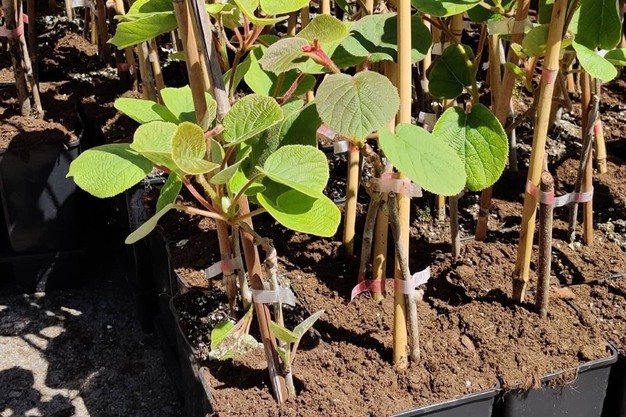The planting season for deciduous fruit trees has concluded in Greece. "Kiwifruit, apricots, and kakis were the top three products of this year's planting season. Cherries, peaches, and nectarines saw good sales, while there was very weak demand for apples, as growers once again had poor earnings from them," says Mr. Michalis Tsesmelis, owner of Tsesmelis Nurseries.
"Demand for kiwifruit was enormous. Hayward is the principal variety sought by growers, but there were also plantings of yellow varieties. Kiwifruit plantings are being carried out without any real collective plan. Plantings are being made by anyone, anywhere, while there are not enough storage facilities to meet the needs of the crop. And yet, there is optimism because Italy is still very weak in green kiwifruit. This helps Greece transition into the most important green kiwifruit-growing country in Europe," stresses Mr. Tsesmelis.
Apricots were a cheaper alternative for growers. As Mr. Tsesmelis says: "The cost of establishing an apricot orchard stands at 3,500 euros per hectare, while for kiwifruit at 15.000-20.000 euros. This is why apricots have proven to be a suitable choice for those looking to set up new growing activities from the beginning. Pella, Imathia, Halkidiki, and the Peloponnese were once again the areas where the greatest demand for apricots came from. Growers are interested in self-pollinating varieties that are resistant to sharka. They prefer high-yielding varieties, even if their fruits are somewhat smaller. It is preferable to have 800 tons per hectare of 2A caliber fruit than 400 tons per hectare of 3A."

"Αs for kakis, sales skyrocketed. Three years ago, we were selling only 3.000 to 5.000 items, and this season we sold 25.000 plants. There was great demand for Rojo Brillante. 80% of the sales were of this variety, while the remainder was Jiro. Kaki plantings are still being carried out only in the cold areas of northern Greece, in Pella and Imathia," the Greek entrepreneur stresses.
"Concerning peaches, growers opted for both older and new varieties for all parts of the season. The most important thing, however, is that it seems growers are returning to peach cultivation," says Mr. Tsesmelis. As he describes: "There were many years when growers were uprooting peach trees, or they were planting mostly nectarines. This season seems to be a turning point, and I think it's possible that next season we will see a new expansion in peach acreage."
"What's more, growers continue to shape their trees and orchards according to the cup system, just reducing the tree size somewhat. 2D orchards indeed facilitate easier and mechanized orchard management, but they require higher investments, and experience shows that the outcome in terms of fruit color, size, and quality is not good enough to justify these extra investments," the Greek nursery owner concludes.
For more information:
Michalis Tsesmelis
Tsesmelis Nurseries
Tel: +30 2331 093344
Email: info@tsesmelis.gr
https://tsesmelis.gr/en/tsesmelis-fruit-nut-tree-nursery/
